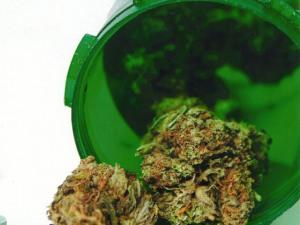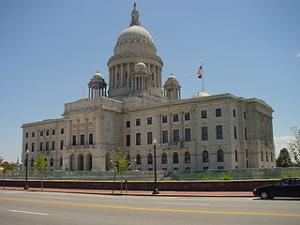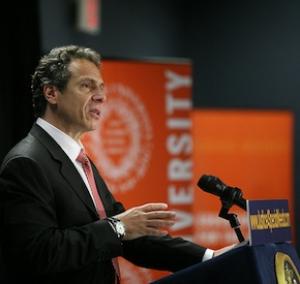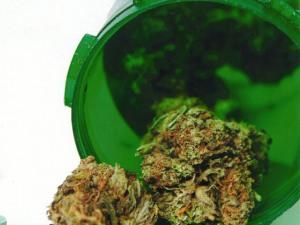A bill that would bring sorely lacking statewide regulation to California's medical marijuana industry passed the Assembly Thursday and now heads to the Senate.
New York decriminalized pot possession 35 years ago, but NYPD keeps arresting and jailing people for "possession in public view" after forcing them to empty their pockets. Now, the governor and NYC mayor are behind a change in the law to prevent that practice.
A bill to make simple hard drug possession a misdemeanor instead of a felony was defeated in the California Senate by members who were afraid they could "see Amsterdam" on the horizon. Oh, the horror!
Connecticut Gov. Dan Malloy has signed a medical marijuana bill passed by the legislature last month.
Decriminalization bills passed both houses of the Rhode Island General Assembly Monday night. There are just a pair of housekeeping votes before the measure heads to Gov. Lincoln Chafee (I).
The New Hampshire legislature has sent a medical marijuana bill to the governor's desk, but the governor has threatened a veto, and the push is on to either find a veto-proof majority or get the governor to change his mind.
A new Angus-Reid poll is the latest to show majority support for legalization. It also found broad support for the idea that the drug war is a failure, but not for legalizing other drugs.
A new poll show support for marijuana legalization below 50% in California and suggests some demographic groups that need some attention if it is to receive majority support.
Detroit elected officials' efforts to block city residents from voting to legalize marijuana have been shot down by the state Supreme Court. The issue should be on the primary ballot in August.
More Massachusetts voters will have a chance to weigh in on marijuana policy if a series of signature-gathering campaigns in electoral districts succeeds. It already has in one district. This will be the 7th consecutive election activists have put marijuana-related questions on ballots in the Bay State.
Connecticut becomes the 17th medical marijuana state, localities in various medical marijuana states continue to try to keep a lid on the green medicine, and two raids go down and 34 warning letters go down in LA County right at press time.
What's the matter with Kansas? Two corrupt cops stories out of the Jayhawk State this week, but also tales out of Arkansas, New York, and Pennsylvania.
Events and quotes of note from this week's drug policy events of years past.
Law Enforcement Against Prohibition is hiring an Assistant Media Relations Director, probably but not necessarily working in San Francisco or Washington, DC. Apply by next week.
A bill that would for the first time bring statewide regulation to California's chaotic medical marijuana industry passed the Assembly Thursday. The legislation, Assembly Bill 2312, barely passed on a 41-29 vote, with 41 votes being the minimum required to move the legislation to the Senate before a Friday deadline.

Medical-marijuana-sign_8.jpg
It must still be approved by the Senate and signed by
Gov. Jerry Brown before it becomes law.
Pushed by patients, dispensaries, and advocates organized into the broad-based coalition
Californians to Regulate Medical Marijuana (
CRMM) and sponsored by Assemblyman Tom
Ammiano (D-San Francisco), the bill would create a nine-member commission to come up with regulations to govern medical marijuana enterprises. Under California's current medical marijuana laws, there is no statewide regulation, leaving a patchwork quilt of often conflicting local approaches to the issue.
The result has been uneven implementation of the law, with some areas flooded with unregulated dispensaries, while others ban their operation, leaving patients to grow their own or seek it out on the black market. The lack of state regulation has also left an opening for recalcitrant prosecutors and law enforcement officials to criminally prosecute dispensary operators and growers under differing interpretations of the state's laws. And it has left an opening for federal prosecutor and the DEA to swoop in, claiming the unregulated dispensaries are little more than "pot shops."
In the wake of the lack of clarity at the state level, counties and municipalities across the state have considered or enacted their own regulatory schemes or outright bans. The result is a situation where what is tolerated on one side of a suburban highway may be prosecuted on the other side.
In a sop to medical marijuana opponents,
Ammiano accepted an amendment that would allow localities to continue to ban dispensaries. The bill originally would have required that local governments allow at least one dispensary for every 50,000 residents unless voters in a local initiative decided otherwise. Now, city or county elected officials could make that decision. That means even with statewide regulations, the patchwork quilt effect could remain.
But the language was necessary to win enough votes among Democrats to get the bill passed. No Republicans voted for it.
"The people of California, the attorney general and even law enforcement and patients, all want a clear set of rules to regulate an industry that has been in existence since 1996,"
Ammiano said, noting broad support for medical marijuana in the state. "Cartels and other organized crime thrive in unregulated markets. Today's vote was significant because it represents a considerable shift that the legislature is now willing to take responsibility for the effective regulation of medical cannabis in California. With the continuing federal crackdown, we simply cannot afford to continue keeping our heads in the sand and pretend that everything is fine."
Since last fall, when federal prosecutors in the state announced their crackdown, the DEA has raided numerous dispensaries and other medical marijuana-related businesses, including
Oaksterdam University. In the past year, hundreds of dispensaries have shuttered their doors, in part because of the fear of federal prosecution and in part because of local moves against them.
Hostility to medical marijuana was evident in the Assembly debate before the bill passed, with some members continuing to deny that it has any medical utility.
Medical marijuana is "a phrase that is meaningless," said
Assemblywoman Linda
Halderman (R-Fresno), a doctor and surgeon. The discussion about it is really a debate over "whether people should be able to legally get high," she said.
Assemblyman Dan Wagner (R-Irvine) complained about the make-up of the bill's Board of Medical Marijuana Enforcement, which would include two patients, an industry representative, and a doctor familiar with medical marijuana among its nine representatives.
"Something smells when you stack the deck like that, and we know what that smell is," he said.
But
Assemblywoman Susan
Bonilla (D-Concord) said it was time to get real. "What it does is begin the process of regulation of something that is happening anyway," she said.
"Some people want to preserve the chaos and confusion to say that medical marijuana has failed or is a sham,"
Ammiano said during the debate in response to Republican critics.
The bill was modeled after an initiative crafted by
CRMM last winter after the federal crackdown began. The group, which includes the core of the team behind 2010's Proposition 19 effort, briefly tried to get the measure on the ballot this year before shifting gears to work with
Ammiano in trying to get it passed through the legislature after realizing it did not have sufficient funding for a costly signature-gathering effort.
CRMM pronounced itself pleased with the bill's progress so far.
"More than 15 years after Californians passed Proposition 215, patients are still in need of a commonsense approach to the production and distribution of medical marijuana," said Don Duncan, California Director with
Americans for Safe Access, one of the member organizations of
CRMM. "We applaud the Assembly for taking leadership on statewide regulations and we hope the state Senate also does the right thing by addressing medical marijuana as a public health issue."
Now, it's on to the Senate. California could still end up with a state-regulated medical marijuana industry this year.
back to top
The New York Times reported Sunday that Governor Andrew Cuomo (D) would come out Monday in support of legislation that would halt the NYPD's practice of arresting people for public possession of marijuana after stopping and frisking them and ordering them to empty their pockets. By Monday, New York City Mayor Michael Bloomberg and NYPD Police Commissioner Ray Kelly both agreed, throwing their support behind the proposal.
New York actually decriminalized the possession of up to an ounce of pot back in 1977, meaning people caught with small amounts of marijuana would only be ticketed -- not arrested -- but beginning with the administration of then Mayor Rudy
Giuliani, the NYPD began violating the spirit of the law (if not the letter) with its policy of forcing people it stopped to pull out their baggies, then charging them with the
arrestable misdemeanor of public possession of marijuana. That meant an average 24-hour stay in the city's jails for people who should only have been issued a citation, as well as a criminal record.
Police in New York arrested a little more than 2,000 people a year for marijuana during the
1980s and through the
mid-1990s, but as the city's stop-and-frisk campaign began under
Giuliani and accelerated in the wake of 9/11, those numbers skyrocketed, averaging more than 40,000 a year since 1995. Last year it was more than 50,000, nearly nine out of 10 of them black or Latino.
Mayor Bloomberg had previously opposed efforts to revise the law to prevent abuses like those practiced by the NYPD, but in a
Monday statement, he changed his tune. Because the proposed changes would still allow arrest for actually smoking or selling marijuana, they "strike the right balance," the mayor said.
The legislation the governor and the mayor are getting behind is
Assembly Bill 7620 and its companion,
Senate Bill 5187. Those bills would standardize penalties for marijuana possession by striking the language about "in public view" and "burning" from the state's marijuana law. But Cuomo and Bloomberg don't want "burning" to be decriminalized, so some haggling is likely to take place.
It's about time, said activists from the
Drug Policy Alliance, the
Institute for Juvenile Justice Reform and Alternatives, and
VOCAL, a group representing people affected by AIDS, drug use, or exposure to the criminal justice system. The three groups have been spearheading the effort to get the bills through the legislature.
"Governor Cuomo has demonstrated real leadership and with his recognition that the NYPD is unlawfully arresting tens of thousands of young people; this is a tremendous advancement to ending these egregious police practices," said Gabriel
Sayegh, New York state director for the Drug Policy Alliance. "We cannot have laws applied differently to different groups of people when the dividing line is race. The legislature must now act and reform these policies, and only then will New York fully realize the intent of the 1977 marijuana decriminalization law."
"Governor Cuomo's call is well appreciated and welcomed by a growing coalition of faith and civil rights leaders who have been working to ensure a jail-free future for our youth by investing in community development and resources that are far more effective at guiding our youth in the choices they make towards fulfilling their best potential," said
Kyung Ji Kate
Rhee of the Institute for Juvenile Justice Reform and Alternatives.
"By taking up this issue Governor Cuomo is taking a major step forward to ending the
criminalization of young men of color. This shows great leadership by our governor to address racially biased practices and restore the relationship between communities of color and our government," according to Alfredo
Carrasquillo, community organizer for VOCAL New York and former victim of illegal marijuana arrests.
Those three groups, as well as others, are preparing a big push in the next two weeks to get the bills passed. Plans include an online media campaign and a mass rally in Albany on June 12. Stay tuned.
back to top
A bill that would have decreased the penalties for simple drug possession from felonies to misdemeanors died last Thursday in the California Senate. The proposed measure, Senate Bill 1506, was defeated on a vote of 24-11.
The bill was introduced by Sen. Mark Leno (D-San Francisco), and would have reduced the charges for possession of small amounts of heroin, cocaine, and methamphetamine. Leno argued that the measure would save the state money and result in more people getting drug treatment so they could reenter society.
"No data begins to suggest that putting felonies on these mostly young people and incarcerating them for longer periods of time in any way benefits their recovery from drug use," Leno told his colleagues before the vote.
But his Senate colleagues, including some Democrats, sided with law enforcement lobbyists, who opposed the bill.
"I don't understand how decriminalization will actually reduce crime in California," said Sen. Ted Gaines (R-Roseville).
Actually, by nearly any measure -- violent crimes, property crimes, murders -- the number of serious criminal offenses in California has
dropped by about half in the past 20 years.
"With bills like this I can see Amsterdam from the capitol front porch," said Sen. Doug La
Malfa (
R-Richvale), who voted against the measure.
No word yet on whether Leno will try again next year.
back to top
Gov. Dannel Malloy (D) last Friday signed into law the medical marijuana bill, House Bill 5389, passed last month by the legislature, making Connecticut the 17th state to legalize the medicinal use of the herb, along with the District of Columbia. Now, licensed physicians will be able to prescribe it to adults suffering from specified diseases or medical conditions.

Medical marijuana is coming to Connecticut (CO DOT)
"For years, we've heard from so many patients with chronic diseases who undergo treatments like chemotherapy or radiation and are denied the palliative benefits that medical marijuana would provide," Malloy said in a
signing statement. "With careful regulation and safeguards, this law will allow a doctor and a patient to decide what is in that patient’s best interest."
Under the new law, patients must receive a written recommendation from a physician and register with the Department of Consumer Protection. Patients and their primary caregivers can possess up to a one-month supply, although how much that is has yet to be determined. It will be decided by a board of eight physicians.
Qualifying conditions include cancer, glaucoma, AIDS or HIV, Parkinson's disease, multiple sclerosis, damage to the nervous tissue of the spinal cord with objective neurological indication of intractable spasticity, epilepsy,
cachexia (emaciation often caused by cancer or cardiac diseases), wasting syndrome,
Chrohn's disease, post-traumatic stress disorder, and other medical conditions, treatments and diseases.
Patients will be able to obtain their medicine at licensed dispensaries. Only certified pharmacists may apply to run the dispensaries. They will be supplied by at least three, but no more than 10, licensed medical marijuana growers, each of which will pay a fee of $25,000.
"We don't want Connecticut to follow the path pursued by some other states, which essentially would legalize marijuana for anyone willing to find the right doctor and get the right prescription," Malloy said. "In my opinion, such efforts run counter to federal law. Under this law, however, the Department of Consumer Protection will be able to carefully regulate and monitor the medicinal use of this drug in order to avoid the problems encountered in some other states."
Malloy thanked Senate Majority Leader Martin
Looney (D-New Haven,
Hamden), State Senator Eric Coleman (D-Bloomfield), State Representative Gerald Fox, III (D-Stamford), and State Representative Penny
Bacchiochi (R-Somers, Stafford, Union) for their leadership in passing the bill.
Passage of the bill comes after years of work by patients and advocates, including seeing an earlier version of the bill passed by the legislature only to be vetoed by then
Gov. Jodi
Rell (R).
back to top
Both chambers of the Rhode Island General Assembly voted Monday evening to approve marijuana decriminalization bills. Each measure now faces only a procedural vote in the other chamber before the bill goes to Gov. Lincoln Chafee (I).

Rhode Island State House, Providence (wikimedia.org)
has
so far declined to say whether he will sign it or veto it. The
Marijuana Policy Project is
urging its Ocean State supporters to contact the governor now to urge him to sign it.
If
Chafee signs the bill into law, Rhode Island would join its northeastern neighbors Connecticut, Maine, Massachusetts, New York, and Pennsylvania is choosing to remove criminal penalties for possession of small amounts of pot. Nationwide,
14 states have decriminalized, the first wave in the
1970s and the second beginning with Nevada in 2001 and picking up momentum in recent years.
The measure passed easily in both houses of the General Assembly. The Senate approved the bill,
Senate Bill 2253, by a vote of 28-6 and the House approved its companion bill, House Bill 7092 by a vote of 50-24.
The bill would make the possession of up to an ounce of marijuana a civil offense punishable by a fine of $150 for most offenses. Under current Rhode Island law, pot possession is a misdemeanor punishable by up to a year in jail and a $500 fine.
"I am proud of my colleagues for voting to replace a criminal penalty and possible jail time for marijuana possession with a more sensible civil fine," said Sen. Josh Miller (D-Cranston), one of the bill sponsors. "This unique policy change is something our state can do to immediately help our citizens. It will still punish marijuana use, while avoiding the harsh collateral consequences that come with a criminal conviction that can ruin Rhode Islanders' job, education, and housing prospects. It will also save our state millions in enforcement costs and help to educate our at-risk youth."
"Now that the legislature has acted, I urge
Gov.
Chafee to sign this bill without delay," said Rep. John Edwards (D-Portsmouth), another sponsor. "It is unfair to label nonviolent and non-destructive citizens as criminals simply because they possess a small amount of a substance that has been proven safer than alcohol. Additionally, allowing law enforcement to issue a simple citation for marijuana possession -- as opposed to having to make an arrest -- will give our state law enforcement more time to devote to policing, preventing, and solving crimes of violence and against property, ultimately making our streets safer."
The bills have strong public support. A
Public Policy Polling survey in January showed that 65% of likely voters supported decriminalization. Support came from across the political spectrum, with 73% of Democrats, 64% of Republicans, and 60% of independents in favor of the measure.
"At a time when Rhode Island municipalities are laying off police officers and experiencing severe budget problems, it makes no sense to waste scarce resources arresting simple marijuana users," said Robert
Capecchi, legislative analyst for the Marijuana Policy Project. "By signing these bills into law,
Gov.
Chafee can take a significant step toward increased fiscal security, public safety, and sensible justice. Rhode Islanders deserve to be treated as fairly as their neighbors when it comes to marijuana policy."
The not-so-hot-potato is now in the governor's lap. If those poll numbers are to be trusted and the will of the legislature is to be respected,
Chafee has an easy call.
back to top
In conference committee votes as the legislative session ticked down Wednesday, the New Hampshire House and Senate gave final approval to a medical marijuana bill, Senate Bill 409, and sent it to Gov. John Lynch (D). Lynch earlier this year indicated he will veto the bill.
That has bill supporters scrambling to come up with a veto-proof majority or to persuade Lynch to change his mind. They need 16 Senate votes to override, but only got 13 on Wednesday's vote. (One bill sponsor was absent.) The House overwhelmingly approved the medical marijuana bill earlier this year.
"Most senators now agree we have a moral obligation to protect seriously ill patients from being arrested in our state," said Sen. Jim
Forsyther (R-Stafford), who vowed to continue to seek additional support in the Senate for an override if necessary. "There is no excuse for maintaining criminal penalties against patients in our state when Vermont, Maine, and 15 other states have created exceptions under state law for medical use. New Hampshire truly deserves better, and if there's any way to get SB 409 passed into law, I will continue doing my best to make that happen."
"Over the years, we have convinced many legislators to support this critical reform," said Rep.
Evalyn Merrick (D-Lancaster), a cancer survivor who credits medical marijuana with easing her struggle. "With support either from
Gov. Lynch or from two additional senators, this bill can finally pass and patients will finally have legal access to medical marijuana."
"SB 409 has earned strong support in both the House and Senate, and soon Gov.Lynch will have an opportunity to do the right thing and sign it into law," added Matt Simon, a legislative analyst for the
Marijuana Policy Project.
Now, it's all eyes on the governor.
back to top
An Angus-Reid Public Opinion poll released Wednesday is just the latest to show majority support for marijuana legalization. The poll had support for legalization at 52%, with 44% opposed.
That's in line with a Rasmussen poll released a couple of weeks ago that had support for legalizing and regulating marijuana at 56%, and also in line with other recent polls that show legalizing gaining majority support and trending upward.
In the Angus-Reid poll, majorities of men (60%), independents (57%), people under 55 (54%) and Democrats (54%) supported pot legalization, while people over 55 (48%), women (45%), and Republicans (43%) were less likely to support it.
Marijuana legalization is on the ballot this year in Colorado and Washington, with signature-gathering campaigns for more legalization initiatives still underway in Michigan, Montana, Nebraska, and Oregon. The West has generally shown higher levels of support for legalization than the rest of the country, but Angus-Reid has not made a geographic breakdown of support available for this poll.
While a majority supports marijuana legalization, that's not the case for other drugs. Only 10% would support legalizing ecstasy, 9% cocaine, 8% heroin or crack cocaine, and 7% methamphetamine.
But two-thirds (66%) think the war on drugs is a failure, while only 10% think it has been a success. That opinion cuts across the political spectrum, with majorities of independents (69%), Republicans (63%), and Democrats (63%) saying the drug war is a failure.
Still, 68% thought America has a serious drug problem that affects the whole country. One-fifth (20%) thought drug problems were limited to specific areas and people, while 5% thought America doesn't have a drug problem.
The poll was an online survey of a representative sample of 1,017 American adults with a margin of error of +/-3.1%.
back to top
Californians overwhelmingly support medical marijuana, especially for "patients with terminal and debilitating conditions," but when it comes to legalizing it, a new poll finds the state has a ways to go. According to the USC Dornsife/Los Angeles Times poll, only 46% of respondents favored legalization, with 50% opposed.
On medical marijuana, 80% supported it, with 62% strongly supporting and 18% supporting. Only 17% were opposed, and 3% pronounced themselves undecided.
On marijuana legalization, the poll asked "Do you think marijuana should be legalized for recreational or general use by adults?" One-third (33%) strongly supported legalization, while another 13% supported it. Strong opposition to legalization was at 42%, with soft opposition at 8%, while the remaining 4% either had no opinion or refused to answer.
Looking at the poll's
cross tabs provides a more detailed breakdown of where support for legalization is strong and where it isn't. The cross tabs show majority support for legalization among independents (56%) and Democrats (51%), but not Republicans (28%). Among ethnic groups, half of blacks (50%) support legalization, and 49% of whites, but only 37% of Hispanics. Among people with kids, only 47% support legalization, but that's one point higher than people without kids (46%).
Support for legalization correlates with income. Among people making $50,000 a year or more, support was at 54%, while among people making less than that, support was only at 40%.
The only region of the state with majority support for legalization was the San Francisco Bay area, with 55%, followed by Los Angeles County (49%), Sacramento and Northern California (46%), the Central Coast (42%), Southern California outside of LA County (41%), and the Central Valley (34%).
The gender gap evident in other marijuana polls also shows up in this one. While 51% of men favored legalization, only 41% of women did.
With no legalization initiatives making the ballot this year, California activists have at least two years to work on upping the numbers. It looks like they better be prepared to do a lot of talking to Hispanic women with kids and low-paying jobs.
back to top
The Michigan Supreme Court has cleared the way -- finally -- for Detroiters to vote on a marijuana legalization initiative. The high court Friday refused to hear an expedited appeal of a February appeals court ruling that Detroit election officials had acted improperly when they blocked the measure from getting on the ballot.

Detroit skyline (saferdetroit.net)
That means Detroit residents can expect to see the initiative on the August 7 primary ballot. The
initiative, sponsored by the
Coalition for a Safer Detroit, would legalize the possession of up to an ounce of marijuana by adults 21 and over by amending the city's controlled substances ordinance to say that it does not apply to small-time pot possession by adults.
Although initiative supporters had cleared all the legal hurtles to making the ballot back in 2010, the measure was opposed by the Detroit City Council, especially Council President Charles Pugh, who also serves as chairman of the Detroit Election Commission. The commission voted 3-0 to block the measure from appearing on the city ballot.
But initiative advocates were undeterred and persevered in pursuing the matter through the courts. Now, with the Supreme Court rejecting the city's motion for immediate consideration of its appeal, they have prevailed.
"A long trail of voter abuse by the City of Detroit has come to an end," said the Coalition's Tim Beck, in an e-mail to supporters. "We got everything right. Our petitions were flawless," said Beck.
Detroit Mayor Bing had no comment Friday evening, but a Detroit police spokesman told the
Detroit Free Press the department could adapt to legalization "if it's handled in an appropriate way, and this is what the citizens of Detroit choose."
That's a remarkably open-minded and democratic statement from Detroit police, especially when compared to law enforcement reactions elsewhere to legalization, lowest law enforcement priority, and medical marijuana votes. It will be up to the voters of Detroit to ensure that the department lives up to its word.
back to top
A drive to put non-binding public policy questions on the ballot in select Massachusetts electoral districts this November has cleared its first hurdle. Late last month, the Drug Policy Forum of Massachusetts announced that it had handed the requisite signatures to qualify in the 2nd Berkshire State Representative District.
Voters there will be asked: "Shall the representative from this district be instructed to vote in favor of legislation that would allow the state to regulate and tax marijuana in the same manner as alcohol?"
The group is also doing signature-gathering to get the same question on the ballot in four state senate districts that encompass Cambridge, Somerville, a third of Boston, and eight suburban towns. And it is working to expand the signature-gathering drive to districts that include the rest of Boston. The Drug Policy Forum said it expects 10% of voters in the state to be able to vote on the question by the time the dust settles.
Various drug reform groups are working together on the drives. In addition to the Forum, they include
MassCann/
NORML, Suffolk University
NORML, Boston University
SSDP, and other
SSDP chapters.
This year's non-binding public policy question campaign will mark the seventh consecutive election in which activists have put marijuana policy-related questions to voters. They have yet to lose in 63 votes. In 2010, activists put the tax and regulate public policy question to the test in eight representative and one senate district, winning each, and none by a margin of less than 54%.
Voters across the state will also be voting on a binding medical marijuana referendum, so marijuana will be much on the minds of Bay State voters this year.
back to top
The feds strike again in California, Connecticut becomes the 17th medical marijuana state and New Hampshire could be 18th, and localities in various medical marijuana states continue to try to keep a lid on the green medicine. Let's get to it:
California
Last Wednesday,
a new dispensary opened up in Eagle Rock just a day after an LA City Council committee voted to advance a new ban on dispensaries in the city. The Together For Change dispensary is at the same location as the American Eagle Collective, which was raided and closed by LAPD narcotics officers on May 2. It is supposedly under new ownership, but has the same
décor and even the same security guard as American Eagle.
On Tuesday,
researchers reported that dispensary neighborhoods have no higher crime rates than neighborhoods without dispensaries. The research, which will appear in the July issue of the
Journal of Studies on Alcohol and Drugs, examined 95 neighborhoods in Sacramento in 2009. The researchers found no evidence that neighborhoods with a higher density of medical marijuana dispensaries had higher rates of violent crime or property crime than other neighborhoods. But the authors added that further research is needed because they looked at neighborhoods at only one point in time. A neighborhood's crime patterns could change over time as more medical marijuana dispensaries open.
Also on Tuesday,
CANORML reported that California elections brought mixed results. In Butte County, a measure that would have restricted patients' rights to cultivate on their own property lost 55% to 45%, but in Kern County an ordinance sharply limiting the location of dispensaries passed with 69% of the vote and in Lake County, a grower-led measure to regulate marijuana like agricultural crops was defeated by a margin of 66% to 33%.
In Los Angeles, LA City Attorney Carmen
Trutanich, a staunch nemesis of medical marijuana, failed in his bid to run for District Attorney. That means the contest will be between Jackie Lacey, who believes medical marijuana sales are illegal, and Deputy DA Alan Jackson, who has been more friendly to the cause.
In San Diego, stridently anti-medical marijuana DA Bonnie
Dumanis was crushed in the mayoral primary, getting only 13% of the vote. The November election will feature a choice between medical marijuana foe Carl
Demaio (32%) and medical marijuana supporter Rep. Bob
Filner (30%).
In the
33rd Congressional District, LA
NORML Director Bruce
Margolin came in fourth in the race with 4.5%, followed closely by Libertarian Steve
Collett with 4.3%. Both had made marijuana reform a centerpiece of their campaigns against long-time incumbent Henry
Waxman, who was leading with 45%.
In the race for US Senate, where veteran drug warrior Sen. Dianne Feinstein faced a field of 32 unknown opponents, David Levitt, who had campaigned on drug reform and other progressive issues, got 1.6% of the vote; while Libertarian Gail
Lightfoot got 2%. Feinstein's opponent in November will be Republican Elizabeth
Emken.
On Wednesday,
federal authorities announced a crackdown on LA County dispensaries, with the DEA raiding two dispensaries and federal prosecutors sending warning letters to 34 more. While the feds didn't target the city of Los Angeles, the crackdown seeks to wipe out dispensaries in the cities of Santa Fe Springs, Whittier, South El Monte, La
Mirada, Diamond Bar, Artesia, Paramount, South Gate, City of Commerce,
Agoura Hills and Malibu. The two dispensaries that were raided Wednesday were the Tri-City Patient's Association and the
Canna-America Collective (a.k.a. Organic Way Collective) in Santa Fe Springs. The two dispensaries were also hit with federal civil asset forfeiture lawsuits. The warning letters give the operators and landlords 14 days to come into compliance with federal law or risk potential civil or criminal actions.
Colorado
On Tuesday,
Garfield County commissioners set a June 18 deadline to approve land use regulations for medical marijuana growers in the county. A two-year moratorium on grows expires July 1. One commissioner proposed that the commission require a 1,000-foot buffer zone between grow facilities and schools, parks or churches, in accordance with state law. He also proposed that growers be restricted to commercial zone districts and banned from rural zones, because of concerns about ease of enforcement. He also proposed that Garfield County growers be allowed to sell their products only within the county. But the proposed ban on rural grows and on selling products outside the county drew opposition.
Connecticut
Last Friday,
Connecticut became the 17th medical marijuana state after
Gov. Dan Malloy signed into law the bill passed by the legislature. Patients will obtain their medicine from dispensaries run by licensed pharmacists.
Michigan
Last Thursday,
the state Supreme Court ruled that state law allows an affirmative defense for patients even if they haven't registered with the state. The ACLU of Michigan called the decision a victory for medical marijuana patients throughout the state. In one case ruled on by the court,
Owosso resident Larry King, who suffers from severe and chronic back pain, was issued a medical marijuana card in 2009 by the state after being examined and approved by a doctor. He grew 12 marijuana plants for his own medical use. The
Shiawassee County prosecutor charged him with manufacturing marijuana, a felony, because some of his plants were being grown outside. Drug charges against King initially were thrown out because he was a medical marijuana patient. But the Court of Appeals reinstated felony drug charges against him because it held that King would not be permitted to raise a medical defense at his trial. The higher court's decision reverses the appeals court.
Also last Thursday,
the New Baltimore City Council extended a moratorium on medical marijuana businesses that has been in place since 2009. While in the past, the council had extended the moratorium for six months at a time, this time it was only for two months. The council is hoping some clarity will emerge this summer after the legislature finishes dealing with a package of medical marijuana bills.
Last Sunday,
the Flushing Police announced they were reporting to the federal government medical marijuana users who were seeking to buy firearms. Police Chief Mark
Hoornstra said his department began doing so about six months ago after an FBI training seminar. And it's not just gun buyers.
Hoornstra said his officers report any interactions with individuals identified as medical marijuana patients to the National Instant Criminal Background Check System, or
NICS, even if they are not committing a crime or violating the Michigan Medical Marihuana Act. He said his department has reported about ten patients so far.
On Tuesday,
patient and dispensary advocates threatened to sue the city of Jackson if the city council approves an ordinance saying patients and primary caregivers can only use and grow their medicine in their homes. A council committee voted later that evening in favor of the ordinance. There are already at least two dispensaries in Jackson, and they would be forced to close if the ordinance passes. The Jackson City Council likely will consider the ordinance next Tuesday.
Montana
Last Wednesday,
the state Supreme Court heard arguments in a case challenging a new medical marijuana law passed by the legislature last year. That law bans the commercial sale of medical marijuana. The Montana Cannabis Industry Association challenged it. Chief Justice Mike McGrath said the issue is not whether marijuana has medicinal value, but whether there is a right to sell a drug that federal law labels a Schedule I narcotic. A key component of the 2011 law was to make it illegal for marijuana providers to be compensated for their services and to limit them to three patients each. Supporters said that provision was necessary to end the business of marijuana and to ensure the drug was used as voters intended --to treat the neediest patients. An appeals court judge ordered an injunction that prevented the sales ban from taking effect, saying it would harm people's right to seek health care.
New Hampshire
On Wednesday,
the state legislature gave final approval to a medical marijuana bill, which now heads to the desk of
Gov. John Lynch (D), who earlier said he would veto it. Supporters are scrambling to either persuade Lynch to change his mind or come up with a veto-proof majority. They're not quite there yet.
Washington
On Monday,
the Pasco City Council voted to ban collective medical marijuana grows. Five council members decided to end their year-long moratorium and amend Pasco's zoning code to say the city won't allow anything that violates local, state and federal law. That includes the issuing of a building permit or business license for a collective garden, where authorized patients would grow cannabis plants together. The legislature in 2011 passed a law allowing collective gardens, but
Gov. Chris
Gregoire (D) vetoed parts of it. The city had enacted successive moratoria on grows while waiting for the legislature to act this year, but got tired of waiting.
On Tuesday,
the Kent City Council voted to ban dispensaries and collective gardens. The 4-3 vote came after more than 150 people at the meeting pleaded with the council not to enact the ban. Now, the Cannabis Action Coalition says it plans to sue the city.
back to top
What's the matter with Kansas? Two corrupt cops stories out of the Jayhawk State this week, but also tales out of Arkansas, New York, and Pennsylvania. Let's get to it:
In Stockton, Kansas,
the Rooks County sheriff resigned last Thursday after being on administrative leave since being charged in January with nine felony counts of methamphetamine distribution. Randy
Axelson presented his resignation to the county clerk in the morning, to take effect at noon that day. He had been continuing to collect his salary while on leave. Five of the charges against him involve meth sales within a thousand feet of a school, which carries a stiffer penalty than the four remaining sales charges.
In Holton, Kansas,
a former Sabetha police officer was arrested last Thursday on charges he stole methamphetamine from the department evidence room and resold it. Ryan
Bruggerman went down after an investigation by the Kansas Bureau of Investigation. He is charged with one felony count each of distribution of meth and official misconduct. He was jailed in Holton on $5,000 bond.
In Buffalo, New York,
a Buffalo police officer was arrested last Thursday on charges he was involved in running a marijuana grow-op. Officer Jorge
Melendez, 41, and another man were caught on federal surveillance videos attending a 100-plant grow in a warehouse, and
Melendez was captured on video driving up to the warehouse in his police car. Both men face charges of conspiracy to manufacture more than 100 marijuana plants, maintaining a premises for manufacturing marijuana, and manufacturing more than 100 marijuana plants. The charges carry a mandatory minimum sentence of five years in prison, a maximum of 40 years, a fine of $4,000,000 or both.
In
Hatboro, Pennsylvania,
a former Hatboro narcotics detective was charged last Friday with various counts related to alleged thefts from the department's evidence locker and using his informants to buy drugs for his own personal use. John Becker, 42, had worked for the department for 17 years before a 16-month investigation resulted in his suspension, resignation, and arrest last month. Becker is accused of stealing at least 10 firearms and $18,000 cash from the evidence locker during a six-month period in 2010 and 2011. He is also accused of using snitches to buy
OxyContin, Percocet, and cocaine for him to use throughout 2010.
In New York City,
a former NYPD narcotics detective was acquitted last Wednesday of charges he planted drugs on bar patrons. Adolph
Osback walked after a jury acquitted him of multiple charges of falsifying police reports, perjury and official misconduct after deliberating for only 90 minutes. He was indicted based on testimony of his former partner, Stephen Anderson, who testified that
Osback "flaked" people by planting drugs on them. Anderson has already pleaded guilty to flaking after being caught on surveillance video.
Osbach was fired when he was arrested back in December 2010.
In Little Rock, Arkansas,
a former Marvell police officer was sentenced last Wednesday to two years in federal prison for accepting bribes to look the other way as drug traffickers transited the region. Robert
Wahls was one of five law enforcement officers and 66 other people who were indicted in an investigation called Operation Delta Blues, which focused on drug trafficking and corruption in the Mississippi Delta towns of Helena and West Helena. He pleaded guilty in January to extortion and money laundering, and admitted he took money for escorting someone posing as a drug trafficker.
back to top
June 8, 1993: Leading conservative intellectual William F. Buckley says in an interview, "the amount of money and of legal energy being given to prosecute hundreds of thousands of Americans who are caught with a few ounces of marijuana in their jeans simply makes no sense -- the kindest way to put it. A sterner way to put it is that it is an outrage, an imposition on basic civil liberties and on the reasonable expenditures of social energy."
June 13, 1994: The RAND Corporation releases a study finding that drug treatment programs are seven times more cost effective for reducing cocaine use than law enforcement efforts, 11 times more effective than border interdiction and 23 times more effective than source country efforts.
June 8, 1998: A well-publicized letter signed by more than 600 international leaders and high-profile, influential professionals from various fields is written to UN Secretary General
Kofi Annan urging him to reconsider "failed and futile drug war policies" as the signers believe the war on drugs is now causing more harm than drug abuse itself. The signatories call for opening the debate to alternative approaches to drug abuse based on common sense, science, public health and human rights.
June 12, 1998: US drug czar Barry
McCaffrey announces at the United Nations his plan for drug warriors to dominate the Internet by adding a massive number of web sites.
June 9, 2000: Human Rights Watch releases a study finding that Illinois is the worst state for racial disparity among jailed drug offenders. Illinois' black men are 57 times more likely than white men to be sent to prison on drug charges, and blacks comprise 90 percent of all prison admissions in Illinois for drug charges. Though federal studies show that white drug users outnumber black drug users 5-to-1, blacks make up about 62 percent of prisoners incarcerated on drug charges, compared with 36 percent of whites.
June 11, 2001: In a case relating to indoor marijuana-growing operations, the US Supreme Court rules that the use by the police of a thermal imaging device to detect patterns of heat coming from a private home is a search that requires a warrant.
June 7, 2003: Cheryl Miller, a multiple sclerosis patient and leading medical marijuana advocate, dies from pneumonia and other MS-related complications at 57 years old. She is survived by her husband, Jim, who remains active in the movement.
June 10, 2004: The New York Times publishes an article about K-Drink, a new beverage containing coca produced by the Peruvian company
Kokka Royal Food & Drink. The article reminds readers that "In this region of South America, coca tea is so common and so accepted that it has even been regularly served in the American embassy in Bolivia."
back to top

LEAP badge logo
Law Enforcement Against Prohibition (LEAP) is seeking a talented and motivated individual to work in our media relations department on a part-time basis. LEAP is a nonprofit organization representing police officers, judges, prosecutors and other criminal justice professionals who want to legalize and regulate marijuana and other drugs after witnessing the failure of the "war on drugs" up close.
The
assistant media relations director will report to and work alongside LEAP's full-time media relations director in efforts to inject the voices of pro-legalization law enforcers into high-profile news coverage of the rapidly advancing public debate about failed drug policies.
Specifically, duties will include but are not limited to:
- Writing op-eds and letters-to-the-editor.
- Drafting, editing and distributing press releases.
- Making follow-up pitch calls to reporters and producers.
- Scanning the news to identify PR opportunities.
- Using an online media database to generate lists of journalists to contact.
- Building relationships with journalists.
- Encouraging prominent bloggers to link to or write about interesting drug policy stories.
- Posting comments mentioning LEAP on prominent blogs and online news articles.
- Tracking, circulating and archiving LEAP's news hits.
- Interacting with supporters on social media sites like Facebook, Twitter and Reddit.
Through these and other tactics, the assistant media relations director will help members of the organization's 150-member bureau of law enforcement speakers make their voices heard in the increasingly prominent global drug policy discussion.
The assistant media relations director will preferably -- but not necessarily -- be located in San Francisco, CA or Washington, DC, and will work three days a week (24 hours per week).
QUALIFICATIONS:
- Demonstrated ability to generate positive news coverage for advocacy efforts.
- Familiarity with diverse news organizations across platforms (print, online, broadcast).
- Excellent written and oral communications skills.
- Commitment to LEAP's mission to replace the "war on drugs" with legalized regulation.
- Social media savvy.
- Video editing, graphics and web design skills are major plusses.
- Spanish language fluency a plus but not required.
COMPENSATION:
The assistant media relations director will be compensated at a competitive hourly rate commensurate with experience.
TO APPLY:
Please send a resume, cover letter and (preferably published) short writing sample to Tom Angell, LEAP's media relations director, at [email protected]. Interviews are being conducted on a rolling basis, so interested candidates are encouraged to apply as soon as possible. The application deadline is June 15, 2012.
More information about LEAP is available at http://www.CopsSayLegalizeDrugs.com.
back to top













